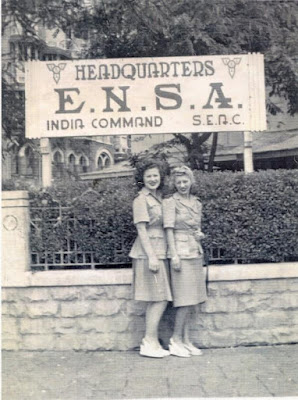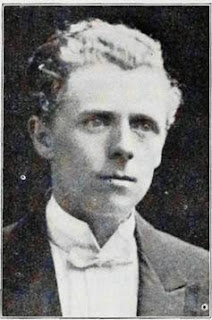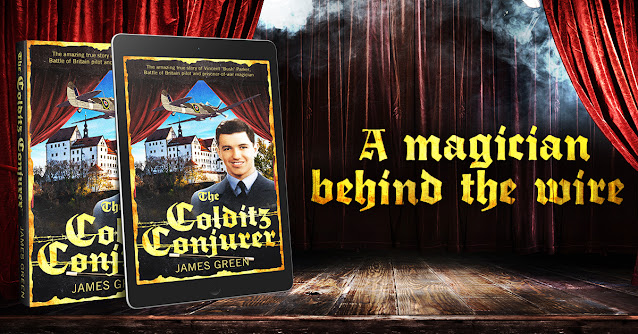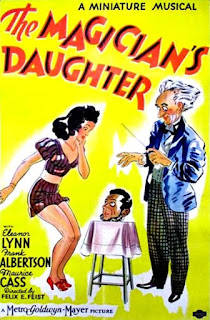Will Ayling: The Genie joins the army
Will Ayling was known as The Genie. This was apt, for he was both a magician and rather short in stature. He discovered magic in his late teens, learned his craft as war clouds loomed across Europe, and deployed his organisational skills to produce entertainments for war-weary troops throughout India and Burma. Post-war, he made a significant contribution to the advancement of the art, as a performer, author, collector and leading member of the magic community.
Learning magic
William Richard Ayling was born on 2 March 1914 in the port city of Portsmouth on England’s south coast.
As a youngster, Will was both ‘arty’ and a Christian. These two interests combined when he joined the drama group of a local church. He got involved in acting, writing and producing a range of entertainments. When the group put on a variety show, Ayling volunteered to find a magician to join the cast. His search was unsuccessful, so he taught himself magic instead.
“I purchased a box of tricks and a couple of books on conjuring and became bitten by the bug.”
Ayling carried on performing magic after the drama group’s show. He bought more tricks and joined the Magicians’ Club, London, by subscription. Will Goldston, the club’s founder and owner, introduced Ayling to famous Polish-Jewish illusionist Horace Goldin. The pair met backstage after one of Goldin’s shows. This experience inspired Ayling’s lifelong interest in ‘illusions’ (normally defined as tricks involving people, animals or large items).
The young magician gave his first public ‘all magic’ show in a small Mission Hall in Portsmouth in his late teens.
Age 21, in 1935, he married Winifred. The couple’s first child arrived two years later. A second was born after the war.
In April 1938, Ayling became one of the founding members of the Portsmouth and District Magic Circle. The society’s early membership was just a dozen members. The more experienced members helped him to improve his magic skills, and they put on regular shows for the public.
But magic was just a hobby for Ayling. To earn a living, he worked various jobs, starting as an errand and delivery boy for a milliner. By the time war came, he was a fruit salesperson.
Preparing for air raids
On 3 September 1939, Great Britain declared war on Germany and mobilised for war.
Ayling wasn’t keen on joining the armed forces.
“As with Mr Average Man, I had no real stomach for the impending conflict. The limbless and sightless victims of the previous war were ample evidence of the futility of such national belligerency.”
He initially supported the war effort through service in the A.R.P.
The A.R.P. (Air Raid Precautions) was a collection of organisations and guidelines set-up by the British Government to protect civilians from the danger of air raids. These included the Raid Wardens’ Service and the Auxiliary Fire Service. From 1941, the A.R.P. changed its title to the Civil Defence Service to reflect the wider range of roles it then encompassed.
As soon as war was declared, Ayling reported for duty in the A.R.P. as an augmentee for the Portsmouth Fire Service. Not long after, he transferred to the First Aid Depot, before turning his hand to training others and earning promotion. As Assistant Superintendent at the Southern A.R.P. Training School, he ran air raid casualty training exercises. He wore the standard uniform of the A.R.P., a blue boiler suit and a steel helmet with “A.R.P.” and his rank painted on it.
The City of Portsmouth, home to the Royal Navy, with facilities such as Portsmouth Dockyard, as well as countless other military and industrial installations, was obviously a prime target for bombing raids by the German Luftwaffe [German: air force]. Portsmouth officially suffered 67 air raids between July 1940 and May 1944.
While his key role was training, Ayling attended some incidents requiring A.R.P. support. Decades later, he could still recall the horrors he witnessed such as the aftermath of aerial bombings.
“The sights of those released from debris and rubble faces ashen, covered in dirt and blood, mingling… limbs and bodies twisted in unnatural shape… the spectacle as a fantasy Hell, set in the flickered orange illumination… the roar of fanned flames and tiny whispering cries and moans of those in pain and indeed the sobs and grunts of effort from those who feverishly worked to rescue.”
Other members of the Portsmouth and District Magic Circle also served in the A.R.P. Ray Wickens earned the George Medal for gallantry for rescuing civilians after an air raid on 10 March 1941. Read more here.
Another Portsmouth based magician, Vic Taylor, lost his house when a German bomb destroyed it. Read more here.
While serving with the A.R.P., Ayling occasionally performed magic on social occasions.
“These were the days when people rallied round each other, making and having a little fun when it was possible,” he recalled after the war. “People developed a concern for one another… there was a common bond… we needed each other… the burden of daily disasters had to be eased and indeed shared and in the little moment’s respite, some light entertainment was welcomed.”
But, for the most part, his hobby had to take a back seat.
First aider to medical officer
As a 25-year-old when World War Two started, it wasn’t long before the British Army conscripted Ayling to join the ranks.
“I was, like many thousands of ordinary chaps, caught up in the bloody strife, to eat my heart out, thinking always of time when one might return home…wondering too, if ever I would return.”
“Conscription to the Army brought me into contact with a wider spectrum of living, meeting men of varied social standing and intelligence…thrown together in common adversity… understanding and comradeship developed, sometimes into lasting friendships.”
During army basic training with The Royal Hampshire Training Centre at Newport on the Isle of Wight, Ayling received a startling introduction to the enemy:
“One early evening, the platoon having come off duty,… the noise of approaching aircraft was heard. Then the staccato crack of machine gun fire, as bullets spluttered against walls and crashed through windows of our dormitory. We all dived under beds…and frequently no one was injured other than the odd bruising occasioned by the hasty descent.”
A lone Messerschmitt fighter returning from a raid on the mainland had shot up the barracks on its way back to France.
After settling into army life, Ayling started showing his colleagues small magic tricks and his bosses quickly cajouled him to contribute to unit concert party shows. At one of these shows, he bravely performed the bullet catch trick.
Noting Ayling’s first aid experience from the A.R.P., army officials appointed him as a senior medical orderly in the Infantry Training Centre’s medical facility. This role suited him more than employment as an infanteer, as he was a reluctant soldier, more prepared to save a life than to take one.
Promotion came quickly and Ayling was later ordered to report for duty with the 2nd Battalion The Royal Hampshire Regiment. The battalion was stationed near Ringwood in the heart of the New Forest. As sergeant in charge of the medical section, he provided medical support to the battalion as it prepared to defend the United Kingdom from a Nazi invasion.
In mid-1942, officials selected Ayling for an officer’s commission in the Royal Army Medical Corps. He completed medical training in Kent, Devon and East Yorkshire, before attending an Officer Cadet Training Unit in Dunbar, Scotland.
Lieutenant Ayling’s first appointment as an officer was to a mobile medical unit known as a Field Ambulance. After a brief stay in Northern Ireland, Ayling was involved in setting up 190 Field Ambulance, based in Slindon, Sussex. Coincidentally, this was just fifteen miles from his home in Portsmouth’s suburbs. He was promoted to the rank of acting Captain in 1943.
In his limited spare time, Ayling continued to meet with fellow magicians and perform for military and civilian audiences.
Entertaining the troops in India and Burma
Despite the hard work of all involved, 190 Field Ambulance was disbanded in 1943 and the unit’s personnel were assigned elsewhere.
294649 Captain Ayling was sent out to British India to join a medical unit there. But not soon after he arrived, he was invited to take on the role of organising E.N.S.A. and Service Entertainment in India’s Eastern Command.
E.N.S.A. (Entertainments National Service Association) was a wartime civilian organisation established to entertain the British armed forces at home and abroad. It formed entertainers of all types into touring concert parties and dispatched to perform in venues as diverse as munition factory canteens, air-raid shelters, anti-aircraft sites, supply depots and even front-line positions. E.N.S.A. took over the Drury Lane Theatre in London for its headquarters. Different departments dealt with the many aspects of the business and shows were categorised as A, B, C companies, classics, drama and music, munitions and hospital shows or units.
Given the rank of acting Major for this new role, Ayling was stationed in Calcutta. His task was no sinecure. The Eastern Command spanned thousands of square miles of eastern India and Burma. As E.N.S.A. shows arrived in India from England or elsewhere, Ayling and his team coordinated their despatch and return to troop bases. These venues may have been garrison theatres, or makeshift venues in forward areas.
Ayling was especially responsible for those E.N.S.A. performers appearing in Calcutta. He arranged shows and looked after ‘stars’ such as Gracie Fields, Vera Lynn, Joyce Grenfell, Irene Kohler, Edith Evans and George Formby.
“Getting acquainted with the complexities of the job proved for some time an almost round-the-clock duty. Handling the artistes in the companies required an art and style of which I was not accustomed. Theatre people in the main do not take kindly to any discipline other than that imposed by the very nature of their own particular activity.”
When E.N.S.A. shows or concert parties contained magicians, they found a special welcome from Ayling, who formed friendships with many who passed through. These included Oswald Rae, Ken de Courcy, American Johnny Platt and Janet Glenrose (a former assistant to Fred Culpitt and the first woman to be sawn through by P.T. Selbit, inventor of that most famous illusion).
Read about when Ossie Rae accidentally led an E.N.S.A. company through a firefight with Japanese troops here.
For several months, Major Will Ayling worked alongside (and lived with) Lieutenant Colonel Ned Williams (otherwise known as magician Robert Harbin), who was ostensibly his superior and tasked to inspect E.N.S.A. provision in the Eastern Command. The two magicians became firm friends, spending their spare time devising new tricks and presentations.
Read about Robert Harbin and his wartime work with E.N.S.A. here.
In 1945, Ayling met magicians Jack and Ann Gwynne when the couple toured through Calcutta for the U.S.O. (United Services Organisation, America’s equivalent of E.N.S.A.).
Ayling also made friends with many members of the Indian Society of Magicians, including Eddie Joseph, and they honoured him with Life Membership.
He later wrote that he learned, “a great deal from the many fine artistes who passed through my command and for whose care I was for a while responsible, among them Gracie Fields, George Formby… and many others. But the most important lesson of all was the need to be sincere in what you are putting over to the audience, and to believe in what you wish to project. Whatever the conditions, sell yourself unsparingly… [and] you will ensure that your offering is acceptable.”
A workaholic, Ayling toiled endlessly to provide the best possible entertainment services to the troops. As Officer in Charge of E.N.S.A. and Service Entertainment in India’s Eastern Command, he organised entertainments which were seen by hundreds of thousands of service personnel. From those in the headquarters and rear areas, to those fighting the enemy near to the frontline in eastern India and Burma.
“The entertainer was to bring, so often, welcome relief to shattered minds and tired bodies, in the shelters, hospitals and barracks both at home and abroad,” he wrote after the war.
There was little time for Ayling to perform magic himself, although he gave performances of close-up magic when opportunities presented themselves. One of his firm favourite tricks was ‘Out of this World,’ first marketed by its inventor Paul Curry in 1942. The trick is powerful classic of magic and Will performed it often “just kneeling on the floor or ground, in a Mess or a jungle clearing.”
Generally, Ayling’s work kept him in Calcutta away from the fighting. Perhaps his most dangerous experience was during the Hindu riots in 1945. With the threat of Japanese invasion removed, many Indians no longer welcomed the British. For a time in Calcutta, all artists were confined to their hostels. Mobs attacked the British and, often, the local people who worked for them. Several of Ayling’s military trucks were set on fire and one of his friends was killed and the body badly mutilated. He foresaw, as many other did, India’s post-war call for independence from the United Kingdom.
Back to ‘civvy street’
Ayling returned to the UK by ship in July 1946 and the army ‘demobbed’ him soon after.
“The return to ‘civvy street’ was to prove a difficult period of adjustment and I imagine I was not alone in this. For most, the war years had produced a drastic change of environment… and admittedly, I was one of the lucky ones… I was alive and had returned unscathed. In a relatively short time, I had progressed from the comparative obscurity of the private soldier to one of the responsibility of a command, a Major.”
From these significant military responsibilities, Ayling took a job as a bookkeeper and general dogsbody in a friend’s laundry business. He next took a job as an assistant in a gentleman’s outfitters. This served him well. He stayed with the company for the rest of his career, becoming its co-owner and managing partner.
Despite his own skills as a magician and experience of theatrical management gained from working with E.N.S.A., Ayling lacked the confidence to become a professional magician. With hindsight, this was probably a wise decision. While variety entertainment enjoyed a post-war boom, the industry was in terminal decline by the 1950s; unable to compete with changing audience tastes and the growth of cinema and television.
However, as he settled and his children grew up, Ayling could devote more time to magic. By 1954, he’d put together a full evening magic show, which he called The Genie Show. This grew to be a two-hour full-evening production. He performed it frequently, normally in village and church halls. He gave it a theatricality missing from most magic shows. The show was rich in illusions (a rarity in the post-war era) but Ayling was a capable close-up magician too.
“Will Ayling has the capacity for hard work required to present these different types of shows and the sound magical knowledge needed; the leadership and drive which enables a full evening show to run like a well-oiled machine; the ability to adapt himself to audiences of different types and ages; above all, he has the charm of manner which endears him to his audience the moment he steps on stage.”
The Portsmouth and District Magic Circle reformed after the war, and he was an active member. He became Honorary Secretary and later the society’s President on three occasions. To this day, the society has a ‘Will Ayling Close-up Competition’ in his memory. He joined the London-based Magic Circle in 1948 and was ‘elevated’ to its prestigious Inner Magic Circle within the following decade. He also joined the International Brotherhood of Magicians (I.B.M.) and served as President of the British chapter of the club (Ring No. 25) from 1981 to 82.
Read about another Portsmouth-based magician who performed with puppets here.
And find out about the former E.N.S.A. magician who built the world’s largest model railway here.
A Genie and a Giant
Will Ayling contributed much to magic. He was not a flamboyant personality like many show people, that was not his style. In fact, Will was a quiet and unassuming man who always had time to assist those seeking more knowledge and was someone who genuinely cared about his fellow magicians and all those around him.
“Small in stature, Will nevertheless strode though magic like a gentle giant, a man against whom I never heard an unkind word,” said John Fisher, acclaimed TV producer and magic historian.
“Whereas other magicians practising at his level might impress with the effects they performed or the personality with which they endowed their material, Will always went a step further and surrounded his entire performance, whether a short act or full evening show, with a care, flair and attention to every detail of showmanship.”
“Both on and off stage Will Ayling was a Gentleman – in the true sense of the word. Gentle in manner and speech, kind and considerate in his dealings with others and always willing to lend a helping hand where most needed.”
Marked by his modesty and generosity to others, Will Ayling achieved fame locally and within the magic community, but never became a household name.
He died on 23 May 1992, aged 78, while travelling to a show.
*****
Will Ayling’s other connection to the military came after his death. One of his former magic assistants in his last few years of life was Penny Mordaunt, now a British Member of Parliament. She became the UK’s first female Minister of State for the Armed Forces (2015 -2016) and later the first female Secretary of State for Defence (2019).
Quoted text is taken from ‘Will Ayling, Illusionist Extraordinaire - An Autobiography of a Nobody’ (1992) by Will Ayling (published posthumously, with foreword and afterword by John Fisher.






















Comments
Post a Comment